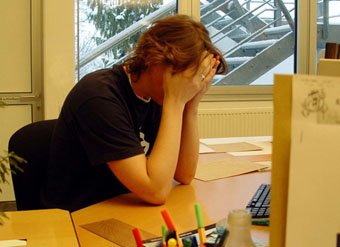
Last week on a Facebook networking group, someone asked the question -“what problems are you working with more frequently than in the past?”
I wrote – lack of focus and being less productive.
Then, on the BBC program “The
Becoming too distracted
The reasoning behind this reduction is because we are being constantly distracted by the alerts. But even if you switch the phone off, your mind is still constantly being drawn to the fact a phone is there and a message might come through at any moment.
This confirms my own experiences with students, who have become addicted to answering the alerts as soon as they cause their mobile’s to buzz or ping. Even turning them to silence doesn’t work, as you can tell if a message or call is coming through by the vibration.
This is highly distracting and can lead to a huge loss in productive work, as people’s mental capacities are being drawn away and then refocused.
So what’s going on?
If you’ve ever heard about Pavlov and his dogs, you know we can condition animals to start salivate when a bell is rung and you immediately provide them with food. With mobile’s we are getting an alert which might be important or good.
In his book “Focus – the Hidden driver of excellence” Daniel Goleman cites the work of Richard Davidson on the state of mind being important. When we’re feeling upbeat our left-hand pre-frontal cortex is in charge and can remind us of the positive outcome for knuckling down and doing some work. If we’re fatigued (and switching back and forth will fatigue us) then we lose some of that ability to focus on the important tasks.
To be able to focus well, it’s best to erradicate possible distractions, which means putting your device in another room whilst you are trying to work on a specific task. Quiet or non-intrusive music can be played, but anything which can grab your attention will draw your mind away.
Willpower
In his book, “Willpower” Roy Baumeister mentions research carried out on what people were thinking about during the day. Not surprisingly it turned out to be about food, sleep and sex. ( We are hardwired to think about these things because it’s part of our survival mechanism.) But also up there was a very strong desire to take a break and check emails, surf the internet, listen to music and watching TV. This means that a large amount of our time, when we should be concentrating and being focused on writing a report or revising for exams is being taken up subconsciously with cries of tiredness, wanting a drink and wanting to know what your friends are doing/saying on Facebook.
Naturally occuring cycles
Consider the circadian cycle. This naturally
We become very absorbed and can focus much better in the middle of a cycle. Consequently, it gets more distracted as your mind gets tired, at the end of a cycle.
I work my circadian cycle out by looking at the times I’m going to sleep, getting up in the night and waking in the morning. I then count forward so I can
Focus can shift in these times, so I usually schedule my deep work times at
Focusing on what’s good
As a solution-focused therapist, I ask my clients “What’s been good this week?” there is a very good reason for this. It’s all about what “we are paying attention to”. Laura Carstensen, a psychologist from Standford University made an interesting discovery. When presenting both positive and negative imagery to a range of subjects having their brain’s scanned Carstensen saw a difference with age.
In young people, their amygdala’s fired when looking at both types of images, in older people it was only with positive pictures. Carstensen hypothesized that older people had trained their pre-frontal cortex to inhibit the amygdala. So the elderly people just had rewired their brains to ignore the negative and focus on the positive.
We can achieve the same with gratitude exercises. By skillfully managing your attention, you can focus better without being distracted by constant negative thoughts.
Location Location Location
You won’t be surprised to read that where you carry out your focusing work is of vital importance. The key is to reduce distractions. If you work in a large open plan office. This is good for creative ideas but terrible for periods of focused attention – if you need to concentrate. Ideally, you need a quiet office space with no distractions. Some suggest no windows and silence, but I personally would struggle with that having worked in environments with no windows. To stop my eyes from tiring, I prefer to look at nature. If I do have music on, I prefer classical or baroque – no distracting lyrics.
If you work from home then don’t work on the kitchen table unless you’re the only one at home. I have a desk in my lounge and in my therapy room, so I can escape if need be. A shed at the bottom of the garden is ideal, as it allows you to build a habit of going to a certain location to do a specific task. This helps prime your mind for a long period of focus.
Other things which can help are:
- Keep hydrated
- Relax between periods of focus
- Take exercise between periods of focus
- Be strict with planning. Your diary is your best friend.
Did you know though, that meditation and hypnotherapy are good for focus and productivity
Some good reading material on focus and productivity are:
Focus-Hidden Excellence-Daniel Goleman
Hyperfocus-Work Less Achieve More- Chris Bailey
Also see Tools which can help
